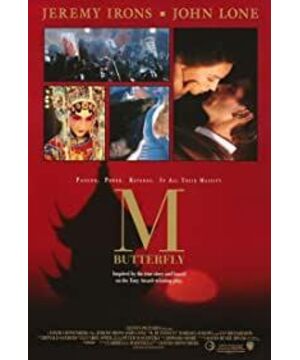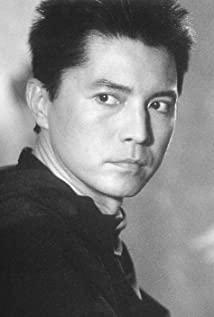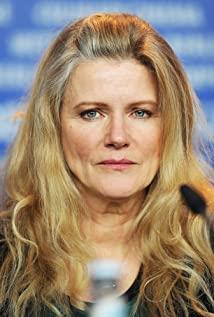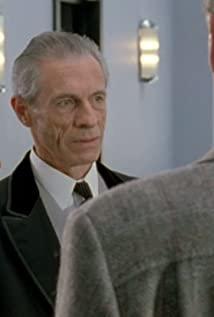Before watching these two films, in the class of Oriental Literature History, the teacher showed a slideshow with two stills of the actors, one is Song Liling and the other is Gao Renni. At that time, the teacher asked him to guess who played the male role and who played the heroine in the movie. In fact, after watching the stills, it is easy to come to the conclusion that Song Liling plays the role of a woman, and Gao Renni plays the role of a man. I think so. However, after watching the film, I doubted my judgment. This suspicion is coincidental. I watched it twice in a row. When the first time ended, Gao Renni said in prison, "My name is Gao Renni, and I have another name, Mrs. Butterfly." And when the second time started, the name of the movie came out "Mr. Butterfly", this Lord Butterfly, undoubtedly referring to the Chinese actress Song Liling. At this time, I realized that it turned out that Song Liling played a male role without looking at her appearance and temperament, so she called it "Mr. Butterfly"; while Gao Renni played a female role: Mrs. Butterfly. As Mrs. Butterfly, Gao Renni paid too much for love, including her family and career, and even her loyalty to the motherland and her own life. He is the "Mrs. Butterfly" of the West. And Song Liling, even though she has devoted herself to her true love, she always seems to be missing something like a scratch. He is like the US Navy in the opera "Mrs. Butterfly", who made his lover wait for several years, but in the end, what he waited for was prison. In order to better let the audience understand the true direction of Mr. Butterfly and Mrs. Butterfly expressed in the film, the director put a lot of effort into it. First, this story could have been simply handled as "Lust and Caution", where a woman used beauty to deceive intelligence. But here the director used an actor like Zun Long to express this "most unscrupulous love". The intent inside contains an attempt to better define Mr. Butterfly. Second, at the end of the film, Song Liling got on the plane in a suit and leather shoes and became an ordinary man; while Gao Renni painted nails and played the role of a woman. This further explains the intent.
Many viewers can see this kind of interposition between men and women in the film, but the cultural intention here is difficult to understand. The picture quality and sound quality of this film are not ideal, the tone is dim, and the sound is mixed with this dripping sound. When I read the film, I try not to think about the plot and characters, and try to find the cultural thinking in it. First, the film satirizes and ridicules Eastern and Western cultures on the basis of thinking. For Western culture: On the one hand, Gao Renni's wife said that the Chinese were wiping their noses on the street, but on the other hand, they were doing these things recklessly at home; in the court, the judge wanted to ask the kind of Insignificant erotic details were hesitant, but Song Liling told them bluntly; when Gao Renni had an extramarital affair with the diplomat's wife, she found out that her body was bloated and ugly, and she was extremely disappointed in surprise. These captures of Western cultural details are undoubtedly in place. And some characteristics of Western culture, just like the diplomat's wife's body, although it can be seen from a distance but not accessible, full of mystery, but when it is really naked, it is ugly. For Eastern culture: the traditional Chinese concepts that Song Liling fabricated are naive and ridiculous. It is simply nonsense about what to say about sex positions, about women's dignity, about returning to their parents' home when they are pregnant, and so on. However, those traditions of oriental culture are plain, but there is no essential difference from those nonsense, and there are endless lies beneath the traditional form. Second, the film also makes a detailed display of the curiosity and conflict between the two cultures. Talk about a few scenes: When the fire burned the costumes, the Red Guards were playing the accordion; the tea sets in the Western embassies were all Chinese porcelain, and the diplomats also went out to eat Chinese snacks; Chinese actors sang in front of the foreign ambassadors Opera Madame Butterfly and more. These shots already say something. Of course, the most telling thing is Gao Renni's infatuation with Song Liling. Gao Renni is not only fascinated by Song Liling's costumes on the stage, but also infatuated with the beauty of oriental women displayed by Song Liling; even the so-called traditions made up by Song Liling also fascinate her. It's a blind impulse, an addiction to a culture you don't understand. It can be said that "Mrs. Butterfly" partially shows the oriental fantasy of Western culture, while "Mr. Butterfly" fully demonstrates the Westerners' illusion of oriental culture. Distance produces beauty. Not at all. It is precisely because of unfamiliarity and curiosity that "the most indecent love" occurs in different cultural backgrounds. Third, the film deconstructs culture to a certain extent. Culture is not only a product of tradition, but also a product of the times. The most traditional China can also use the love of men and women to carry out shameless deeds; while the most advanced France There are also "men" who insist on love. Among them, the most important thing is human nature. Human nature is the foundation and connotation of all cultures. Whether it is for Mr. Butterfly or Mrs. Butterfly, whether it is the East or the West, whether it is tradition or the times, and culture, the sprouting and occurrence of human nature is the most fundamental reason.
View more about M. Butterfly reviews











